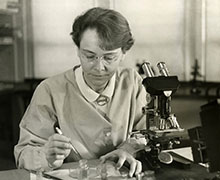

Barbara McClintock was an American cytogeneticist who discovered transposons, which are genetic elements that can move around within the genome. Her work on transposons was groundbreaking, and it helped to revolutionize our understanding of how genes work.
McClintock was born in 1902 in Hartford, Connecticut. She studied biology at Cornell University, where she received her Ph.D. in 1927. After graduating, McClintock worked at the Carnegie Institution of Washington, where she conducted her research on transposons.
McClintock's work on transposons was initially met with scepticism, but it was eventually recognised as groundbreaking. In 1983, she was awarded the Nobel Prize in Physiology or Medicine for her discovery.
McClintock was a pioneer in the field of genetics, and her work has had a profound impact on our understanding of how genes work. She was a brilliant scientist, and she was also a passionate advocate for women in science.
Here are some other key things to know about Barbara McClintock:
Barbara McClintock's discovery of transposons revolutionized our understanding of genetics.

Barbara McClintock is a proper noun.
The name "Barbara McClintock" is of English origin. The given name "Barbara" is of Germanic origin and means "bright fame". The surname "McClintock" is of Scottish origin and means "son of the follower of Saint Columba".
The name "Barbara McClintock" is therefore a combination of two words that both have positive connotations. This is perhaps a fitting name for someone who was such a brilliant and influential scientist.
What is Barbara McClintock famous for?
Question:
Who was Barbara McClintock, and what were her significant contributions to the field of genetics?
Answer:
Barbara McClintock was an American geneticist and cytogeneticist known for her groundbreaking work in the field of genetics. Her significant contribution was the discovery of "transposable elements" or "jumping genes" in maize (corn) plants. McClintock's research demonstrated that certain genetic elements could move within the genome, changing their positions on chromosomes. This discovery challenged conventional views on gene regulation and inheritance. Despite facing initial scepticism, her work was eventually recognised and awarded the Nobel Prize in Physiology or Medicine in 1983. McClintock's discoveries have greatly influenced our understanding of gene expression, genetic regulation, and the complex nature of the genome.
Address
Developing Experts Limited
Exchange Street Buildings
35-37 Exchange Street
Norwich
NR2 1DP
UK
Phone
01603 273515
Email
hello@developingexperts.com
Copyright 2025 Developing Experts, All rights reserved.